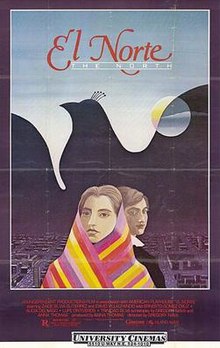El Norte (English: The North) is a 1983 British-American independent drama film, directed by Gregory Nava. The screenplay was written by Gregory Nava and Anna Thomas, based on Nava's story. The movie was first presented at the Telluride Film Festival in 1983, and its wide release was in January 1984.
| El Norte | |
|---|---|
Theatrical release poster | |
| Directed by | Gregory Nava |
| Produced by | Anna Thomas |
| Screenplay by | Gregory Nava Anna Thomas |
| Story by | Gregory Nava |
| Starring | Zaide Silvia Gutiérrez David Villalpando |
| Music by | The Folkloristas Malecio Martinez Linda O'Brien Emil Richards |
| Cinematography | James Glennon |
| Edited by | Betsy Blankett Milicevic |
Production company | American Playhouse Channel Four Films Independent Productions Island Alive Public Broadcasting Service |
| Distributed by | Cinecom International PBS |
Release date |
|
Running time | 139 minutes |
| Country | United Kingdom United States |
| Language | English Quiché Spanish |
| Budget | $800,000 |
The picture was partly funded by the Public Broadcasting Service (PBS), a non-profit public broadcasting television service in the United States.
El Norte received an Oscar nomination for Best Original Screenplay in 1985, the first American independent film to be so honored. In 1995, the film was selected for preservation in the United States National Film Registry by the Library of Congress as being "culturally, historically, or aesthetically significant".
The drama features Zaide Silvia Gutiérrez and David Villalpando, in their first film roles, as two indigenous youths who flee Guatemala in the early 1980s due to the ethnic and political persecution of the Guatemalan Civil War. They head north and travel through Mexico to the United States, arriving in Los Angeles, California, after an arduous journey.
Screenplay
The writing team of Nava and Thomas split the story into three parts:
Arturo Xuncax: The first part takes place in a small rural Guatemalan village called San Pedro and introduces the Xuncax family, a group of indigenous Mayans. Arturo is a coffee picker and his wife a homemaker. Arturo explains to his son, Enrique, his world view and how the indio fares in Guatemalan life, noting that, "to the rich, the peasant is just a pair of strong arms". Arturo and his family then discuss the possibility of going to the United States where "all the people, even the poor, own their own cars". Because of his attempts to form a labor union among the workers, Arturo and the other organizers are attacked and murdered by government troops when a co-worker is bribed to betray them—Arturo's severed head is seen hanging from a tree. When Enrique attempts to climb the tree that displays his father's head, a soldier attacks him. Enrique fights and kills the attacker, then escapes with Rosa and hides in a safe house until morning. Enrique and Rosa thus escape capture, only to learn that many of their fellow villagers have been rounded up by soldiers. The children's mother too "disappears": abducted by soldiers. So, using money given to them by their godmother, Enrique and his sister Rosa decide to flee Guatemala, the land of their birth, and head north.
Coyote: During the second part of the film the two teenagers flee Guatemala, travel through Mexico, and meet a Mexican coyote who guides them across the border. This section includes various comic scenes relating to mutual stereotyping among different ethnic groups; the two attempt to pass themselves off as indigenous Mexicans, failing to convince one Mexican truck driver after naming the wrong destination, but later succeeding in convincing a U.S. Border Patrol officer by copiously peppering their responses with the Mexican word for "fuck", which a neighbor had suggested was how all Mexicans speak. Thus Enrique and Rosa are only deported to a border town in Mexico and not to Guatemala, giving them a base for a second attempt to cross the border. After their first failed attempt to cross the "frontera", where a man posing as a coyote deceives and attempts to rob them, they have a horrific experience when they finally cross the U.S.-Mexican border through a sewer pipe laden with rats; critic Roger Ebert noted:
The scene is horrifying, not least because it's pretty clear these are real rats. Disease-free rats purchased from a laboratory, yes, but real rats all the same, and although Gutierrez was phobic about rats, she insisted on doing her own scenes, and her panic is real.
El Norte: In the final part of the film Rosa and Enrique discover the difficulties of living in the U.S. without official documentation. The brother and sister team find work and a place to live and initially feel good about their decision. However, Rosa nearly is caught up in an immigration raid and must find a new job. Working as a domestic, she is puzzled when her Anglo employer shows her a washing machine. Enrique becomes a busboy and, as his English classes begin to improve his command of the language, he is promoted to a position as a waiter's assistant. He is later approached by a businesswoman who has a better-paying job for him in Chicago as a foreman, which he initially declines; he too encounters problems when a jealous Chicano co-worker reports him to immigration, causing him to flee the restaurant and seek out the businesswoman.
When Enrique finally decides to take the position, Rosa becomes gravely ill with typhus contracted from the rat bites she received during their border crossing. When this happens, Enrique must make the tough decision of missing the flight to Chicago to be by her side, and thus loses the position. As Enrique visits the hospital, Rosa laments that she will not live to enjoy the fruits of their harrowing journey to the U.S. Rosa sums up the film's major theme when she says to Enrique:
In our own land, we have no home. They want to kill us. ... In Mexico, there is only poverty. We can't make a home there either. And here in the north, we aren't accepted. When will we find a home, Enrique? Maybe when we die, we'll find a home.
After Rosa dies peacefully, Enrique is shown once again waiting with the other day-labor hopefuls in a parking lot, offering his services to a man looking for "strong arms"; reviewer Renee Scolaro Rathke observes: "It is a bitter realization that Arturo's words about the poor being nothing but arms for the rich holds true even in El Norte."
Although Enrique is temporarily employed once again, he is distracted by haunting daydreams about his sister's lost desires for a better life. The final shot in the film again shows a severed head hanging from a rope, which may be the same image used in Part I of the film; one critic has commented that a hanging, severed head is "a symbolic device used in some Latin films to signify that the character has committed suicide".
- Zaide Silvia Gutiérrez as Rosa Xuncax
- David Villalpando as Enrique Xuncax
- Ernesto Gómez Cruz as Arturo Xuncax
- Alicia del Lago as Lupe Xuncax
- Lupe Ontiveros as Nacha
- Trinidad Silva as Monte Bravo
- Enrique Castillo as Jorge
- Tony Plana as Carlos
- Diane Cary as Alice Harper
- Mike Gomez as Jaime
The origins of El Norte are the director's experiences in San Diego, California, as he grew up. Nava came from a border family and has relatives on the other side in Tijuana, Baja California. As a youth, he crossed the border several times a week, often wondering who lived in all those cardboard shacks on the Mexican side.
For research the producers of El Norte learned about the plight of indigenous Guatemalans from years of research, much of it conducted among exiles living in Southern California. According to Nava, "There are hundreds of thousands of refugees from Central America in Los Angeles alone. Nobody knows the exact number, but a recent television inquiry estimated 300,000-400,000. In our own research, we came across a community of Mayans from Guatemala—5,000 from one village—now in Los Angeles. The original village, which is now dead, had 15,000."
Annette Insdorf, writing for The New York Times, said Nava discussed the singular nature of the US-Mexico border. Nava said:
The border is unique—the only place in the world where an industrialized first-world nation shares the border with a third-world country. In California, it's just a fence: on one side are the Tijuana slums, on the other side—San Diego. It's so graphic! This was the germ of the story.
The motion picture has become a staple of high school Spanish language and Human Geography classes throughout the United States and multiculturalism studies in college.
Financing
Nava and Anna Thomas spent two years raising money for El Norte but they consciously did not pursue film studios or television networks because, more than likely, studio executives would demand changes be made in either script, casting, or both. Gregory Nava and Thomas believe that much of what makes El Norte special would have been jeopardized if a major studio had been involved in the filmmaking process.
Financing for the film was provided by PBS's American Playhouse (50%) and the rest in pre-sales. One such pre-sale was made to the United Kingdom's Channel 4 (a public-service television broadcaster).
Magical realism
Parts of El Norte provide an example of how Latin American magical realism, primarily found in novels, has been depicted in a theatrical film. The Washington Post writer Ann Hornaday said: El Norte was seminal, both for its graceful blend of classical narrative and magic realism, and the power with which it brought an otherwise invisible world to life."
Indigenous view and bigotry
El Norte portrays an Amerindian point-of-view and this is exemplified by the religion they follow. An example is when Rosa Xuncax sings the eulogy at the funeral of her father and its Native American Maya religious theme. A traditional Maya belief is that life has a cyclical nature. Rosa sings in her Maya tongue:
We came only to sleep, to dream. All things are lent to us. We are only on Earth in passing.
Throughout El Norte young Rosa and Enrique and their family are subjected to many epithets, hatred, and bigotry due to their indigenous heritage. When the father Arturo inadvertently kills a soldier, for example, a ladino screams:
That bastard Indian killed Puma!
And, when Rosa and Enrique reach their destination in Mexico, a passenger screams at the timid Maya youngsters:
We have arrived to Tijuana, you damn Indians.
Guatemalan exodus
David Villalpando, the actor who played Enrique Xuncax, gave an interview to Lear Media about what the film meant to him and why he believes the film is important. Villalpando said:
Fifteen years ago, the indigenous people in Guatemala were living a cruel extermination that forced them to flee toward Mexico and the United States. This exodus lasted a decade and half a million Guatemalans made the journey to the United States seeking for asylum and refuge ... El Norte became a powerful fighting element, grew an audience, searched audiences, and left the theaters to tell its truth.
When Nava and his production crew were, more or less, kicked out of Mexico during the film shoot, he had to re-create a Mexican village in California. Nava said: "We were filming in Mexico during the end of the López Portillo presidency, one of the last of the old-fashioned caciques to rule Mexico. One day, men with machine guns took over the set. I had guns pointed at my head. We were forced to shut down production, bribe our way out of the country, fight to get our costumes back, and start shooting again in California. Ironically, in the United States our extras were real Mayan refugees. They were the people the movie was about."
Nava tells the story that, at one point, Mexican police kidnapped their accountant and held him for ransom, while, at the same time, his parents had to pose as tourists in order to smuggle exposed film out of the country in their suitcases.
Filming locations
Watch movie El Norte Film online on Amazon
Watch movie El Norte Film online
Watch The Movie On PrimeKhoya Khoya Chand Full HD Movie Download

Salakhen (1975) Full HD Movie Download
.jpg)
Zulm Ki Zanjeer Full HD Movie Download

No One Killed Jessica Full HD Movie Download

Singhasan Full HD Movie Download

Cheppu Full HD Movie Download

Saudagar Full HD Movie Download

Qila Full HD Movie Download

Mahiya - Call of Love Full HD Movie Download

Maa (1976) Full HD Movie Download
.jpg)
Bakula Namdeo Ghotale Full HD Movie Download

Ganga Kinnare Pyaar Pukkare Full HD Movie Download

Mere Chor Mandli Full HD Movie Download

Aakhari Khat Full HD Movie Download

Vaddante Dabbu Full HD Movie Download

Dada Phakt Tuzhyasathi Full HD Movie Download

The Matrix Reloaded Full HD Movie Download

Nammude Naadu Full HD Movie Download

Bharya Biddalu Full HD Movie Download

Lakshami Narasima Full HD Movie Download

Mashaal (1984) Full HD Movie Download
.jpg)
Download latest Movie from bollywood
- 1> baaghi 3
- 2> THE SKY IS PINK MOVIE FULL STORY AND REVIEW
- 3> Luka Chuppi
- 4> TO ALL THE BOYS I’VE LOVED BEFORE
- 5> Kabir Singh
- 6> Street Dancer 3D
- 7> Simmba
- 8> Gone Girl
- 9> The Girl Who Lived
- 10> Ludo
- 11> DILWALE DULHANIA LE JAYENGE
- 12> GUILTY
- 13> The Godfather
- 14> Adventures of Rusty
- 15> Sooryavanshi
- 16> Satyameva Jayate 2
- 17> Thappad
- 18> Bhool Bhulaiyaa 2
- 19> KGFChapter 2
- 20> Mardaani 2
- 21> Pinjar
- 22> Shivaji maharaj
- 23> Ek Villian 2
- 24> Hungama 2
- 25> Divergent
- 26> Mumbai Saga
- 27> The Internship
- 28> HIT (telugu)
- 29> Panga
- 30> The perfect date
- 31> 16 December
- 32> Gopala Gopala (Telugu)
- 33> Brahmastra
- 34> Gangubai Kathiawadi
- 35> Manmadhudu
- 36> Nenu local
- 37> Mahanati
- 38> Shatamanam bavathi
- 39> Lagaan
- 40> After
- 41> MOM
- 42> Shamshera
- 43> Raguvaran BTech
- 44> Khakee
- 45> The villain
- 46> OM
- 47> Mr. perfect
- 48> Bueatifull mind
- 49> Hichki
- 50> Gabbar Singh
- 51> Jogi
- 52> Before Sunrise
- 53> Before Sunset
- 54> Before Midnight
- 55> The Big Bull
- 56> Top Gun: Maverick
- 57> The Purge
- 58> The Sky is Pink
- 59> Laxmmi Bomb
- 60> Sadak 2
- 61> Sufna
- 62> Prithviraj
- 63> PK
- 64> Coolie No 1(2020)
- 65> Black Widow
- 66> Dear Zindagi
- 67> Dil Bechara
- 68> PHIR HERA PHERI
- 69> WAR
- 70> Dostana
- 71> RRR: Roudram Ranam Rudhiram
- 72> Maidan
- 73> Dabbang 3
- 74> Chhalaang
- 75> life as we know it
- 76> SherShaah
- 77> Sandeep Aur Pinky Faraar
- 78> Event Horizon
- 79> 83
- 80> Radhe: Your Most Wanted Bhai
- 81> Gunjan Saxena: The Kargil Girl
- 82> Mr India
- 83> Vivah
- 84> Anokha Bandhan
- 85> Ghost
- 86> Bhoot: Part One - The Haunted Ship
- 87> Haseen Dilruba
- 88> Laal Singh Chaddha
- 89> Qismat
- 90> Rajput
- 91> Drive
- 92> Dil Chahta Hai
- 93> Dil Ki Baazi
- 94> Dil Ka Rishta
- 95> Teesri Manzil
- 96> Dil
- 97> Love Aaj Kal
- 98> Khaali Peeli
- 99> Bunty Aur Babli 2
- 100> Atrangi Re
- 101> Gulabo Sitabo
- 102> Jodi
- 103> Suraj Pe Mangal Bhari
- 104> Deewana
- 105> Attack
- 106> Sardar Udham Singh
- 107> Toofan
- 108> THE LOVEBIRDS
- 109> Jersey
- 110> Ginny Weds Sunny
- 111> Thalaivi
- 112> Shiddat
- 113> Angels vs Zombies
- 114> Koi Mil Gya
- 115> Thank God
- 116> Bhuj: The Pride of India
- 117> Hum Aapke Hain Kaun
- 118> The Platform
- 119> Bird Box
- 120> Roohi Afzana
- 121> Torbaaz
- 122> Nikamma
- 123> World War Z
- 124> Extraction
- 125> Train to Busan
- 126> Life of Pi
- 127> SHAADI MEIN JROOR AANA
- 128> Himmat Aur Mehnat
- 129> To All The Boys: P.S. I Still Love You
- 130> Mimi
- 131> Good Newwz
- 132> Shubh Mangal Zyada Saavdhan
- 133> Raabta
- 134> Harry Potter and the Philosopher's Stone
- 135> Harry Potter and the Chamber of Secrets
- 136> Chhapaak
- 137> War of the Worlds
- 138> Harry Potter and the Prisoner of Azkaban
- 139> Harry Potter and the Goblet of Fire
- 140> MURDER MYSTERY
- 141> Shakuntala Devi
- 142> Bachchan Pandey
- 143> Jayeshbhai Jordar
- 144> Sheer Qorma
- 145> Saina
- 146> 'O' Pushpa I hate tears
- 147> Kedarnath
- 148> MS Dhoni The Untold Story
- 149> Chhichhore
- 150> Badhaai Ho
- 151> Unstoppable
- 152> Oz the Great And Powerful
- 153> The Girl on the Train
- 154> Haathi Mere Saathi 2020
- 155> The Conjuring: The Devil Made Me Do It
- 156> Gandhi Se Pehle Gandhi
- 157> The Song of Scorpions
- 158> Srimanthudu
- 159> Hello Guru Prema Kosame
- 160> Beauty and The Beast
- 161> Black Panther
- 162> Charlie and the Chocolate Factory
- 163> Bole Chudiyan
- 164> Fidaa
- 165> Duvvada Jagannadham
- 166> Bruce Lee: The Fighter
- 167> Hyper
- 168> Yaara
- 169> Red (2020)
- 170> Shivam
- 171> That Is Mahalakshmi
- 172> Nishabdham
- 173> Aashram 2020 web series
- 174> Laxmii
- 175> Mismatched
- 176> STUDENT OF THE YEAR 2
- 177> NAIL POLISH
- 178> Ramprasad Ki Tehrvi
- 179> KAAGAZ
- 180> 12 o Clock
- 181> The Power
- 182> bolo hau
- 183> Tribhanga
- 184> JAMUN
- 185> Madam Chief Minister
- 186> Maasaab
- 187> Aadhaar
- 188> Tanhaji
- 189> Bhaagi 3
- 190> Bhootnath
- 191> MALANG
- 192> Jai Mummy Di
- 193> Haathi Mere Saathi 2021
- 194> Shakeela
- 195> Unpaused
- 196> Annayya
- 197> Vamsoddharakudu
- 198> Mrugaraju
- 199> Narasimha Naidu
- 200> Sankranti
- 201> Manasu Maata Vinadhu
- 202> Anjaane
- 203> Apaharan
- 204> Bachke Rehna Re Baba
- 205> Bewafaa
- 206> Roohi
- 207> Radhe
- 208> Zindagi Khoobsoorat Hai
- 209> Yeh Mohabbat Hai
- 210> Yeh Kya Ho Raha Hai?
- 211> The Tomorrow War
- 212> DehradunDiary
- 213> Meri Shaadi Karaoo
- 214> Matruu Ki Bijlee Ka Mandola
- 215> No One Killed Jesica
- 216> Aag Ka Goola
- 217> Eight Million Dollars
- 218> Three Hundred
- 219> Cats and Dog
- 220> Decoy
- 221> Gold Rush
- 222> You Have Got Mail
- 223> Final Destination three
- 224> Tofan
- 225> Jungle
Request for Download movie El Norte Film
- Bollywood movies
- Latest Bollywood movies
- Download all bengali movies
- Download all bhojpuri movies
- Download all english movies
- Download all gujarati movies
- Download all hindi movies
- Download all kannada movies
- Download all malayalam movies
- Download all marathi movies
- Download all oriya movies
- Download all punjabi movies
- Download all tamil movies
- Download all telugu movies
- Bollywood action movies
- Bollywood adventure movies
- Bollywood animation movies
- Bollywood classical movies
- Bollywood comedy movies
- Bollywood crime movies
- Bollywood devotional movies
- Bollywood documentary movies
- Bollywood drama movies
- Bollywood family movies
- Bollywood fantasy movies
- Bollywood historical movies
- Bollywood history movies
- Bollywood horror movies
- Bollywood musical movies
- Bollywood mystery movies
- Bollywood mythological movies
- Bollywood patriotic movies
- Bollywood romance movies
- Bollywood romantic movies
- Bollywood sci-fi movies
- Bollywood social movies
- Bollywood spiritual movies
- Bollywood sports movies
- Bollywood suspense movies
- Bollywood thriller movies
- Bollywood war movies
- Hot actress list
- Hot gujarati actress list
- Hot tamil actress list
- Hot bhojpuri actress list
- Hot assam actress list
- Hot bihari actress list
- Hot jammu and kashmir actress list
- Hot gujarati actress list
- Hot haryana actress list
- Hot konkani actress list
- Hot marathi actress list
- Hot odia actress list
- Hot punjabi actress list
- Hot rajasthani actress list
- Hot kannada actress list
- Hot malayalam actress list
- Hot telugu actress list
- Hot tulu actress list
- Hot Actress list from Indian city
- Hot actress list from ahmedabad
- Hot actress list from alappuzha
- Hot actress list from bangalore
- Hot actress list from bangalore
- Hot actress list from bhopal
- Hot actress list from chandigarh
- Hot actress list from chennai
- Hot actress list from guwahati
- Hot actress list from hyderabad, india
- Hot actress list from indore
- Hot actress list from jaipur
- Hot actress list from kannur
- Hot actress list from kochi
- Hot actress list from kolkata
- Hot actress list from kollam
- Hot actress list from kottayam
- Hot actress list from kozhikode
- Hot actress list from lucknow
- Hot actress list from madurai
- Hot actress list from mangalore
- Hot actress list from mumbai
- Hot actress list from mysore
- Hot actress list from new delhi
- Hot actress list from patna
- Hot actress list from pune
- Hot actress list from thiruvananthapuram
- Hot actress list from thrissur
- Hot actress list from tiruchirappalli
- Hot actress list from vijayawada
- Hot actress list from visakhapatnam
- All Bollywood Movies
- Bollywood Celeb
- >Art Director
- >Audiography
- >Background Music
- >Banner
- >Choreographer
- >Cinematographer
- >Costume Designer
- >Dialogue Writer
- >Director
- >Distributor
- >Editor
- >Executive Producer
- >Hair Stylist
- >Lyricist
- >Music Director
- >Photographer
- >Playback Singers
- >Presenter
- >Producer
- >Production Company
- >Production Designer
- >Screenplay
- >Singer
- >Sound
- >Actor
- >Story Writer
- >Studio
- >Video Director
- >Miscellaneous
- >Publicity (pro)
- >Web Creator
- >Production Labs
- >Publicity Design
- >Publicity Stills
- >Writer
- >Miscellaneous Artists
- >Visual Effects
- >Reporter
- >Music Company
- >Shooting Studios
- >Picturised On
- >Line Producer
- >Co Producer
- >Asst Director
- >Casting Director
- >Cinematography
- >Choreography
- >Dialouge
- >Editing
- >Lyrics
- >Music
- >Story
- >Playback Singer Female
- >Playback Singer Male
- >Actor In A Comic Role (male/female)
- >Child Artiste
- >Ensemble Cast
- >Actor Popular Choice (male)
- >Actor Popular Choice (female)
- >Sa Re Ga Ma Pa Song Of The Year
- >Actor In Supporting Role
- >Actress In Supporting Role
- >Actor In Leading Role
- >Art Direction
- >Actress In Leading Role
- >Sound Recording
- >Costume Design
- >Special Effects
- >Action
- >Actor In A Negative Role
- >Lifetime Achievement Award
- >Cinematic Exellence (director)
- >Cinematic Exellence (male)
- >Cinematic Exellence (female)
- >International Male Icon
- >International Female Icon
- >Actor In A Supporting Role (male)
- >Actor In A Supporting Role (female)
- >Actor In A Comic Role
- >Playback Singer (male)
- >Playback Singer (female)
- >Most Promising Debut (female)
- >Most Promising Debut (male)
- >Most Promising Director
- >Sound Design
- >Lifetime Jodi
- >Marketed Film
- >Jury Award For Best Actor
- >Jury Award For Best Actress
- >Jury Award For Best Film
- >Jury Award For Best Director
- >Playback Singer(male)
- >Lifetime Acheivement Award (male)
- >Excellence Award
- >Jodi Award
- >Performer Of The Year
- >Presented By
 Story of movie El Norte Film :
Story of movie El Norte Film : 